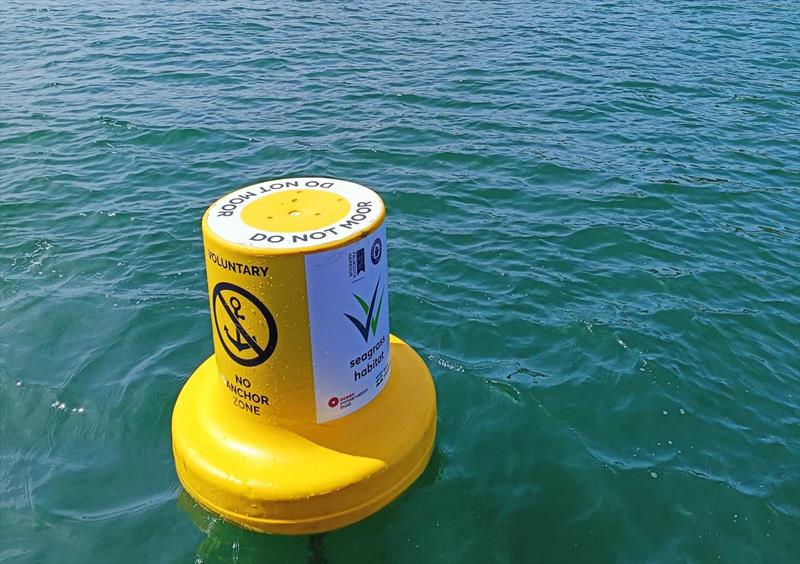
Falmouth's new "Blue Meadows" buoys protecting seagrass fields
by Falmouth Harbour 19 Aug 2024 11:31 BST

The new Advanced Mooring System (AMS) buoys designed, developed and installed off Trefusis Head by Mylor Mooring Services Ltd mark sensitive seagrass habitats whilst keeping their own mooring chains off the seabed © Mylor Mooring Services Ltd
A new generation of Blue Meadows "smart" buoys are marking sensitive habitats of seagrass and maerl around Falmouth Harbour, whilst keeping their own mooring chains from scouring the seabed beneath them.
The new Port Notice Advanced Mooring System (PNAMS) markers designed, developed and installed by Mylor Mooring Services Ltd also do the work of keeping their mooring risers off the seabed without the need for floats just under the surface of the water - as trialled in some older AMS pioneer projects.
The seagrass bed off Trefusis Point is now marked by two of the new-generation AMS buoys, as already used for the St Mawes Harbour 8 knot speed markers and in the Helford River to protect seagrass beds.
The new "Blue Meadows" marker buoys represent a partnership between Falmouth Harbour and the Ocean Conservation Trust, Mylor Mooring Services Ltd and Cornwall Council. They bring the total of markers in Falmouth Harbour and Bay up to 26, all in place to mark and protect around 30 hectares seagrass habitat which are physically damaged by vessels anchoring.
Falmouth Harbour's Environment Manager Vicki Spooner says, "It has been a pleasure working with three very different organisations with a shared aim to raise awareness of seagrass and other sensitive habitats and to reduce the impacts on them of anchoring and mooring on the seabed.
"They ultimately contribute to our goal of increasing biodiversity within harbour waters. We need to ensure these habitats don't just survive but thrive."
Seagrass is deemed a wonder-plant, vital for marine life which depends on its meadows for food and shelter and vital to the health of seas and the environment as it captures carbon and provides a host of other 'ecosystem services' including providing a nursery for juvenile species and minimising the impacts of extreme weather events by dampening the force of waves and keeping sediments in place.
Yet a study by University College London estimates at least 44% per cent of the UK's seagrass has been lost since 1936 with pollution, mining, and farming as well as dredging, bottom-trawling, anchoring and coastal development all contributing to the decline.
Eden Stevens, Blue Meadows Community Engagement Officer at the Ocean Conservation Trust says, "Our collaboration towards the protection and regeneration of our seagrass beds here in Falmouth is a real pleasure and it's even more rewarding to see that these marker buoys are working, with people respecting the voluntary no-anchor zones and anchoring outside of them. It provides hope that the future of seagrass can be a thriving one."
Mylor Mooring Services Ltd's mission is to design, develop and install moorings which are top of their game in terms of vessel safety and security - and at the same time have a minimal interference with the seabed and raise public awareness of the sea environment and its habitats.
"Blue Meadows has given us a great opportunity to work with like-minded partners on a project very close to our hearts," says Ollie Hill of Mylor Mooring Services Ltd. "We are acutely aware of the impacts we all have on the environment and we are really proud to be able to add these buoys to our growing portfolio in this precious part of the world.
"We have identified a significant number of port notice buoys and other marine marks in the Fal and Helford areas all of which could be safely converted to our Port Notice AMS, and we look forward to future collaborations to support this environmental initiative."
The installation of the Blue Meadows AMS marker buoys has been funded by Cornwall Council as part of an offset payment received by Falmouth Harbour in relation to Armed Forces Day last year. It is hoped the same design will be used for other marks over sensitive seabeds as soon as possible.
"Hosting Armed Forces Day in Falmouth was an enormous feat for everyone involved, with more than 100,000 people visiting the town for a wonderful and very successful occasion," says Abby Crosby, Senior Marine Officer from Cornwall Council. "Events of this size can have significant environmental impacts, which were successfully mitigated against thanks to the work of local environmental organisations and key operators including Falmouth Harbour, but it is wonderful to keep the excellent offsetting work going such as via this Blue Meadows work so that our marine environment can flourish."
For more on the work of Falmouth Harbour including the Blue Meadows partnership project with the Ocean Conservation Trust, Mylor Mooring Services Ltd and Cornwall Council - as well as other environmental initiatives - visit Protect our Harbour - Falmouth Harbour, Cornwall or call the Falmouth Harbour team on 01326 213537.